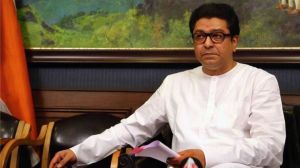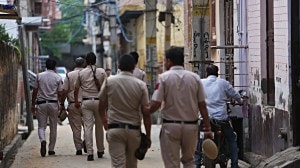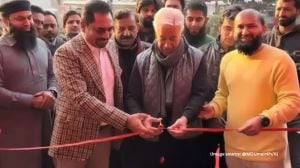PM spells it out: infrastructure
Clearly fatigued by parliamentary disruptions and opposition sniper fire, Prime Minister Manmohan Singh today signalled that he 8216;8216;...

Clearly fatigued by parliamentary disruptions and opposition sniper fire, Prime Minister Manmohan Singh today signalled that he 8216;8216;wanted to make up for lost time8217;8217; by immersing himself in the business of fixing India8217;s infrastructure and getting rid of its 8216;8216;Inspector Raj8217;8217;.
In the process, he also heaped more responsibilities on the Planning Commission, headed by his protege Montek Singh Ahluwalia. The outcome will be a Prime Minister who is involved directly in the nuts and bolts of economic policy, assisted by a Planning Commission that will be more powerful than ever before.
Unburdening himself at the JRD Tata Centenary Celebrations, Singh told India Inc: 8216;8216;Never in the history of any government were the first 100 days characterised by daily turmoil in Parliament.8217;8217;
Then, turning to the subject that held the key to India8217;s economic growth, he spelt out a new role for himself. He said the country was crying out for world-class infrastructure. So the government would start monitoring progress in key infrastructure projects, including airports, power, telecommunications, roads, ports, etc., on a quarterly basis to make sure that targets were being met.
8216;8216;To this end, I am setting up a high-level committee on infrastructure that I will chair myself,8217;8217; he said.
The Planning Commission8217;s larger role was also defined. It would function as the executive arm of this committee and even have the authority to tell different ministries to speed up.
That was not all. The Prime Minister said that the private sector also needed to play its part in improving basic industrial infrastructure. But he acknowledged a critical problem: there were cases when a ministry like oil was in a field as a player as well as a regulator. A more transparent and impartial mechanism was needed, he added.
Again, the Planning Commission would step in. 8216;8216;I have asked the Planning Commission to prepare a paper indicating what the regulatory structure should be for each area,8217;8217; he said.
Speaking after the PM, Ahluwalia elaborated that he was looking at a framework in which the regulator protected the interests of public and private players.
| nbsp; |
Left divided on airport FDI, UPA meeting today
|
||||
| nbsp; |
8226; NEW DELHI: A week ago, Left parties decided to send notes to UPA govt to set the stage for Wednesday8217;s coordination meeting. But one crucial note on FDI cap in airports has not been sent. There are differences among Left partners on FDI for upgradation of Delhi and Mumbai airports with the CPI hinting it8217;s more open on the issue. As for insurance, consensus is that it8217;s not a priority at the moment. |
nbsp; | |||
If all this was music to India Inc8217;s ears, there was more in store. Singh attacked that old bugbear of industry, the Inspector Raj.
8216;8216;I am told that in China an industrial establishment is visited by just six inspectors,8217;8217; said Singh. 8216;8216;I believe that in India many of you find your industrial establishments being visited by over 30 inspectors. Therefore, the tyranny of over-regulation must end.8217;8217;
Singh8217;s solution was to reconstitute the PM8217;s Council of Trade and Industry soon and cut down on red tape.
Making it clear that his aim of achieving 7-8 per cent overall economic growth was no idle election promise, Singh spelt out how it would be achieved. Agriculture would grow at 4 per cent, industry at 10-12 per cent and to make all this possible, the trend of declining capital formation would be reversed. 8216;8216;It is of utmost importance that we create an enabling environment that rewards creativity, risk-taking and the spirit of enterprise,8217;8217; said Singh.
He also underlined the need to check fiscal deficit and improve public finances. He said he had written to Union ministers about the need to improve the functioning of public sector enterpises.
To accelerate private investment, Singh said the two most important requirements are infrastructure and incentives. The incentive structure is more or less in place due to tax reforms. 8216;8216;But I am aware of the need to further simplify the procedures for tax compliance and the finance ministry will address these and related issues in the next Union budget,8217;8217; he said.
- 01
- 02
- 03
- 04
- 05































